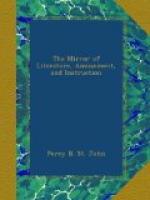The Blind Seal.
About forty years ago a young seal was taken in Clew Bay, and domesticated in the kitchen of a gentleman whose house was situated on the sea-shore. It grew apace, became familiar with the servants, and attached to the house and family; its habits were innocent and gentle, it played with the children, came at its master’s call, and, as the old man described him to me, was “fond as a dog, and playful as a kitten.”
Daily the seal went out to fish, and after providing for his own wants, frequently brought in a salmon or turbot to his master. His delight in summer was to bask in the sun, and in winter to lie before the fire, or, if permitted, creep into the large oven, which at that time formed the regular appendage of an Irish kitchen.
For four years the seal had been thus domesticated, when, unfortunately, a disease, called in this country the crippawn—a kind of paralytic affection of the limbs which generally ends fatally—attacked some black cattle belonging to the master of the house; some died others became infected, and the customary cure produced by changing them to drier pasture failed. A wise woman was consulted, and the hag assured the credulous owner, that the mortality among his cows was occasioned by his retaining an unclean beast about his habitation—the harmless and amusing seal. It must be made away with directly, or the crippawn would continue, and her charms be unequal to avert the malady. The superstitious wretch consented to the hag’s proposal; the seal was put on board a boat, carried out beyond Clare Island, and there committed to the deep, to manage for himself as he best could. The boat returned, the family retired to rest, and next morning a servant awakened her master to tell him that the seal was quietly sleeping in the oven. The poor animal over night came back to his beloved home, crept through an open window, and took possession of his favourite resting-place.




